STAND AGAINST RACISM PRESS RELEASE
CONTACT INFORMATION: YWCA North Central Washington WVC Department of Diversity, Equity and Inclusion Rachel Todd509-630-6132 rachel@ywcancw.org
FOR IMMEDIATE RELEASE
Stand Against Racism: YWCA North Central Washington and Wenatchee Valley College Department of Diversity, Equity and Inclusion Presents Stand Against Racism: Addressing Racism as a Public Health Crisis
Wenatchee, WA – YWCA NCW and WVC Dept. of Diversity, Equity and Inclusion are proud to present the 5th annual Stand Against Racism: Addressing Racism as a Public Health Crisis, over a series of four events. April 27, 12pm, local activist and speaker, Teresa Zepeda, will be addressing the effects of COVID19 on LatinX in the greater Wenatchee area via Zoom webinar. Register at http://bit.ly/SARkeynote .April 28, 6pm, a panel of local experts will speaking on racism in health outcomes via Zoom webinar. Register at http://bit.ly/SARpanel April 29, 4pm Anti-racism march in Wenatche. Mary Big Bull Lewis will be doing the Land Acknowledgement, and Mayor Pro Tem Mark Kulaas will read and sign a Stand Against Racism Proclamation on behalf of the City of Wenatchee. Meet at 4pm at the YWCA Thrift Store (231A N.Wenatchee Ave, Wenatchee, WA 98801).April 30, 4pm Anti-racism march in Omak. Meet at 4pm at Civic League Park (20 South Ash Street, Omak, WA 98841)Public health is, and always has been, central to racial justice work. This year our theme is especially pertinent as our nation continues to face the intersecting public health crises of COVID-19 and racism.Understanding the economic and social determinants of health and how racism impacts public health outcomes is critical to uprooting systemic inequity in communities of color.Economic investment in public health looks like safe and affordable housing, access to quality education, economic advancement opportunities, reliable transportation, availability of healthy foods, and environments free of contamination among other essential resources.Social resources which can reduce negative health outcomes in communities of color include enhanced public safety measures, addressing social norms and attitudes which cause discrimination, and increased social support across our country. This also looks like breaking down barriers to people of color running for and holding elected office in their own communities.By investing in marginalized communities, empowering people of color, and expanding public resources, we can challenge centuries of unfair social, economic, and political systems which contribute to inequity. Each of us can stand against racism by advocating for and supporting our communities in a meaningful way.


